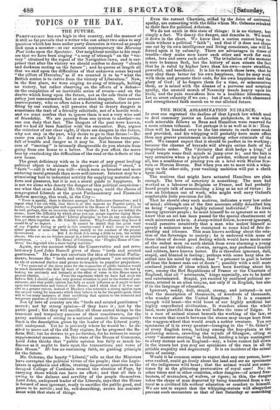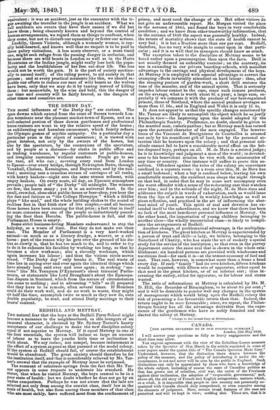THE MOCK ASSASSINATION NUISANCE.
IF ever one regretted the decline of that Lynch law which used to deal summary justice on London pickpockets, it was when such miserable fellows as Bean and Hamilton were reserved for a more solemn tribunal. Yet perhaps it is as well as it is : Ham
ilton will be handed over to the last statute in such cases made and provided, and his whipping will probably have more effect than any graver punishment in deterring other criminals of the sort. ' We cannot expect that it should be perfect in its working; because the charms of bravado will always entice fools of the bragadocio order. The "divinity that doth hedge a king," of itself tempts some frail minds to jump over it ; and the bait is very attractive when a ha'p'orth of powder, without any lead at all, has a semblance of placing you on a level with Mutius Sae- vole or Marcus Brutus. But when you are to meet with a whip- ping on the other side, your vaulting ambition will put a check upon itself.
The motives that might have actuated Hamilton are plain enough. The love of notoriety is something. The man had work.ed as a labourer in Belgium or France, and had probably heard people talk of assassinating a king as an act of virtue : he was an Irishman out of work, who might well envy Oxford's comfortable little provision for life.
That he should obey such motives, indicates a very low order
of mind ; although one of the first accounts oddly described him as being "apparently a highly rational individual." He lived among ignorant people; he must himself be so ignorant as not to know that an act has been passed for the special chastisement of such miscreants as be is. A sharp-witted fellow, however ignorant, would perceive intuitively that a man who makes—himself so openly a nuisance must be consigned to some kind of fate de- grading and irksome. This man knows nothing about the rela- tion of the Sovereign to society; he is endowed with none of those ideas of decent good feeling which would have made some of the rudest men on earth shrink from even alarming a young mother and her children : clowns, savages nay professed bandits and robbers, have known better. He is therefore ignorant, dull, stupid, and blunted in feeling; perhaps with some hazy idea in- stilled into his mind by others, that a prisoner in gaol is better off than the honest man out of doors "; possibly with a still more confused jumble of ideas which have been hurtling about his ears, among the Red Republicans of France or the Chartists of England, that all "aristocrats," kings especially, are to be hated and exterminated. Stupid, yet excited by confused political no- tions, uttered in an alien tongue, not only if in English, but also if in the language of education.
Ignorant, needy, dull, stupid, strong, and irritated—is not
that the description of thousands, of hundreds of thousands, who wander about the United Kingdom ? It is a common enough wild beast—the wild beast of our highly artificial but highly unperfected civilization. It wanders about the whole land, more plentiful than the wolf before the time of Edgar. It is a race of animal almost beneath the working of the law, as the vermin that crawls between the stones may escape hurt from the waggon-wheel that would crush a nobler creature. You see specimens of it in every quarter—lounging in the "St. Giles's" of every English town, lurking among the hop-plants at the gathering season, crowding the wynds of. Glasgow, idling at every" monster meeting" in Ireland, lending a large contingent to every riotous mob in England—nay, a horse cannot fall down in the streets but you may see specimens of the race in all its pitiable stupidity and degeneracy. It is an incident of the actual state of society.
Would it be common sense to expect that any one person, how-
ever exalted, could go freely about the land and see no specimens of the indigenous wild beast ; that the animal would not some- times fly at the glittering provocative of royal ease? No: in other times and in other countries, other dangers—of armed free- booters, of marauders, of wolves, or tigers; in this, the danger takes the shape of man depraved by being transferred from a na- tural to a civilized life suit/tout education, or comfort to himself- We are not to expect that the whipping-statute will altogether prevent such encounters as that of last Saturday Air something equivalent : it was an accident, just as the encounter with the ti- ger awaiting the traveller in the jungle is an accident. What we call accidents are events that have their causes if we did but know them ; being obscurely known and beyond the control of human arrangements, we regard them as things to confront, when they come, but not to disturb our equanimity or fetter our actions. Luckily, Queen Victoria, although a womanly woman, is roy- ally bokl.hearted, and knows well that no respect is to be paid to these paltry visitations. A less acute observer, or a more timid one, might seek refuge from the passing danger in seclusion, and because there are wild beasts in London as well as in the Hartz Mountains or the Indian jungle might really lose both the popu- larity and the healthfulness of! her free out-door life. The loss would not be worth the gain. It is the part of society continu- ally to amend itself; of the ruling power, to aid society in that process ; and at every practical memento like this, we should re- double our efforts to reduce our race of wild beasts as the wolves have been, only that we may do it by taming instead of killing them : but meanwhile, by the wise and bold, this the danger of our time and country will be fairly braved, as the dangers of other times and countries are.



























 Previous page
Previous page